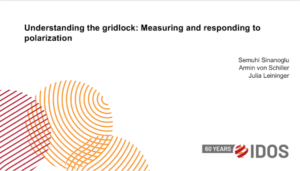The event aimed to unpack the concept of political polarisation and canvass approaches to its measurement. “Understanding the gridlock: Measuring and responding to polarization” is the title of the webinar that IDOS organised in partnership with UNDP’s Global Policy Centre for Governance.

This webinar was the third in a four-part series in which experts and practitioners from the UNDP Team Worldwide explore insights and recommendations from the 2023/24 Human Development Report, to which IDOS also contributed. The session opened with Pedro Conceição, Director of the Human Development Report Office, presenting key findings on polarisation from the report. He discussed how polarisation hinders collective action for human development and endangers democracy. Pedro Conceição highlighted how perceptions of unfairness and insecurity contribute to deepening emotional divides among citizens, who often disagree less sharply than public discourse suggests. In the webinar, the identification and measurement of polarisation were identified as essential for those involved in international cooperation and development.
IDOS researchers Dr Julia Leininger, Armin von Schiller, PhD, and Dr Semuhi Sinanoglu, PhD, then shared key messages on conceptualising and measuring polarisation for development programming. They stressed the need for conceptual clarity, as multiple phenomena are often mischaracterised as polarisation. To illustrate this, they explained how social cohesion and polarisation are connected but distinct concepts, and how the details matter for more effective programme design. Development practitioners, they advised, should invest time in identifying the type of polarisation within their specific context, asking who is polarised and around which issues. Based on this analysis, practitioners can refine their theories of change and tailor programming that addresses the specific characteristics of polarisation.
The IDOS team also provided guidance on evaluating data quality, accuracy, and reliability when measuring polarisation, noting the strengths and weaknesses of various approaches and offering strategies to reduce bias and misinterpretation. They advised practitioners, as data consumers and commissioners of data collection efforts, to critically assess measures of polarisation rather than accepting them at face value. During the event, several representatives from UNDP regional hubs and country offices also shared their own experiences with data collection and programming, enriching the discussion with further practical insights.

Schreibe einen Kommentar